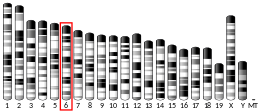WASH complex subunit 2C is a protein that in humans is encoded by the WASHC2C gene.[5] WASHC2C, also known as WASHCAP, VPEF, FAM21A, or FAM21C, is expressed ubiquitously.[6] WASHC2C is intracellular and is mainly in the cytosol associated with vesicles.[6] The protein has a low immune cell, human brain regional, and a low tissue specificity.[7] Some diseases that the protein are associated with are Vaccinia and Transient Tic Disorder.[8]
Function of WASHC2C
editWASHC2C is part of the WASH core complex where it functions as a nucleation-promoting factor (NPF) at the surface of endosomes. Here it recruits and activates the Arp 2/3 complex to induce actin polymerization. Actin polymerization plays a key role in the fission of tubules that serve as transport intermediates during endosome sorting.[7] WASHC2C also mediates the recruitment of F-actin-capping protein dimer to the complex as well as the recruitment of the core complex to endosome membranes via binding to phospholipids. The strongest phospholipid bonding the protein does is with phosphatidylinositol 4-phosphate, phosphatidylinositol 3,5-biphosphate and phosphatidylinositol 5-phosphate.[7] GLUT1 5 is a protein that is recycled via the process of endosome-to-plasma membrane trafficking that WASHC2C plays an important role in .[7] The protein is also required for the endosomal recruitment of CCC, a multi-subunit protein complex, and other subunits such as COMMD1, VPS35L and CCDC93.[9] WASHC2C is involved in several other processes, negative regulation of barned-end actin filament capping, fluid base endocytosis endosomal transport, and regulation of substrate adhesion-dependent cell spreading.[9]
Structure
editThe WASHC2C gene size is about 1320 amino acids with a molecular mass of 144911 daltons (Da) or 144.911 kilodaltons (kDa). The protein has a quaternary structure[10] and a basal isoelectric point of 4.66.[11]
References
edit- ^ a b c GRCh38: Ensembl release 89: ENSG00000172661 – Ensembl, May 2017
- ^ a b c GRCm38: Ensembl release 89: ENSMUSG00000024104 – Ensembl, May 2017
- ^ "Human PubMed Reference:". National Center for Biotechnology Information, U.S. National Library of Medicine.
- ^ "Mouse PubMed Reference:". National Center for Biotechnology Information, U.S. National Library of Medicine.
- ^ "Entrez Gene: FAM21C family with sequence similarity 21, member C".
- ^ a b "WASHC2C WASH complex subunit 2C [Homo sapiens (human)] - Gene - NCBI". www.ncbi.nlm.nih.gov. Retrieved 2022-05-09.
- ^ a b c d "WASHC2C protein expression summary - The Human Protein Atlas". www.proteinatlas.org. Retrieved 2022-05-09.
- ^ "WASHC2C Gene - GeneCards | WAC2C Protein | WAC2C Antibody". www.genecards.org. Retrieved 2022-05-09.
- ^ a b Phillips-Krawczak, Christine A.; Singla, Amika; Starokadomskyy, Petro; Deng, Zhihui; Osborne, Douglas G.; Li, Haiying; Dick, Christopher J.; Gomez, Timothy S.; Koenecke, Megan; Zhang, Jin-San; Dai, Haiming (2015-01-01). "COMMD1 is linked to the WASH complex and regulates endosomal trafficking of the copper transporter ATP7A". Molecular Biology of the Cell. 26 (1): 91–103. doi:10.1091/mbc.E14-06-1073. ISSN 1939-4586. PMC 4279232. PMID 25355947.
- ^ "WASHC2C Gene - GeneCards | WAC2C Protein | WAC2C Antibody". www.genecards.org. Retrieved 2022-05-09.
- ^ "WASHC2C (human)". www.phosphosite.org. Retrieved 2022-05-09.
Further reading
edit- Nagase T, Ishikawa K, Miyajima N, et al. (1998). "Prediction of the coding sequences of unidentified human genes. IX. The complete sequences of 100 new cDNA clones from brain which can code for large proteins in vitro". DNA Res. 5 (1): 31–9. doi:10.1093/dnares/5.1.31. PMID 9628581.
- Strausberg RL, Feingold EA, Grouse LH, et al. (2003). "Generation and initial analysis of more than 15,000 full-length human and mouse cDNA sequences". Proc. Natl. Acad. Sci. U.S.A. 99 (26): 16899–903. Bibcode:2002PNAS...9916899M. doi:10.1073/pnas.242603899. PMC 139241. PMID 12477932.
- Ota T, Suzuki Y, Nishikawa T, et al. (2004). "Complete sequencing and characterization of 21,243 full-length human cDNAs". Nat. Genet. 36 (1): 40–5. doi:10.1038/ng1285. PMID 14702039.
- Brill LM, Salomon AR, Ficarro SB, et al. (2004). "Robust phosphoproteomic profiling of tyrosine phosphorylation sites from human T cells using immobilized metal affinity chromatography and tandem mass spectrometry". Anal. Chem. 76 (10): 2763–72. doi:10.1021/ac035352d. PMID 15144186.
- Deloukas P, Earthrowl ME, Grafham DV, et al. (2004). "The DNA sequence and comparative analysis of human chromosome 10". Nature. 429 (6990): 375–81. Bibcode:2004Natur.429..375D. doi:10.1038/nature02462. PMID 15164054.
- Beausoleil SA, Jedrychowski M, Schwartz D, et al. (2004). "Large-scale characterization of HeLa cell nuclear phosphoproteins". Proc. Natl. Acad. Sci. U.S.A. 101 (33): 12130–5. Bibcode:2004PNAS..10112130B. doi:10.1073/pnas.0404720101. PMC 514446. PMID 15302935.
- Gerhard DS, Wagner L, Feingold EA, et al. (2004). "The status, quality, and expansion of the NIH full-length cDNA project: the Mammalian Gene Collection (MGC)". Genome Res. 14 (10B): 2121–7. doi:10.1101/gr.2596504. PMC 528928. PMID 15489334.
- Lim J, Hao T, Shaw C, et al. (2006). "A protein-protein interaction network for human inherited ataxias and disorders of Purkinje cell degeneration". Cell. 125 (4): 801–14. doi:10.1016/j.cell.2006.03.032. PMID 16713569. S2CID 13709685.
- Beausoleil SA, Villén J, Gerber SA, et al. (2006). "A probability-based approach for high-throughput protein phosphorylation analysis and site localization". Nat. Biotechnol. 24 (10): 1285–92. doi:10.1038/nbt1240. PMID 16964243. S2CID 14294292.
- Olsen JV, Blagoev B, Gnad F, et al. (2006). "Global, in vivo, and site-specific phosphorylation dynamics in signaling networks". Cell. 127 (3): 635–48. doi:10.1016/j.cell.2006.09.026. PMID 17081983. S2CID 7827573.



